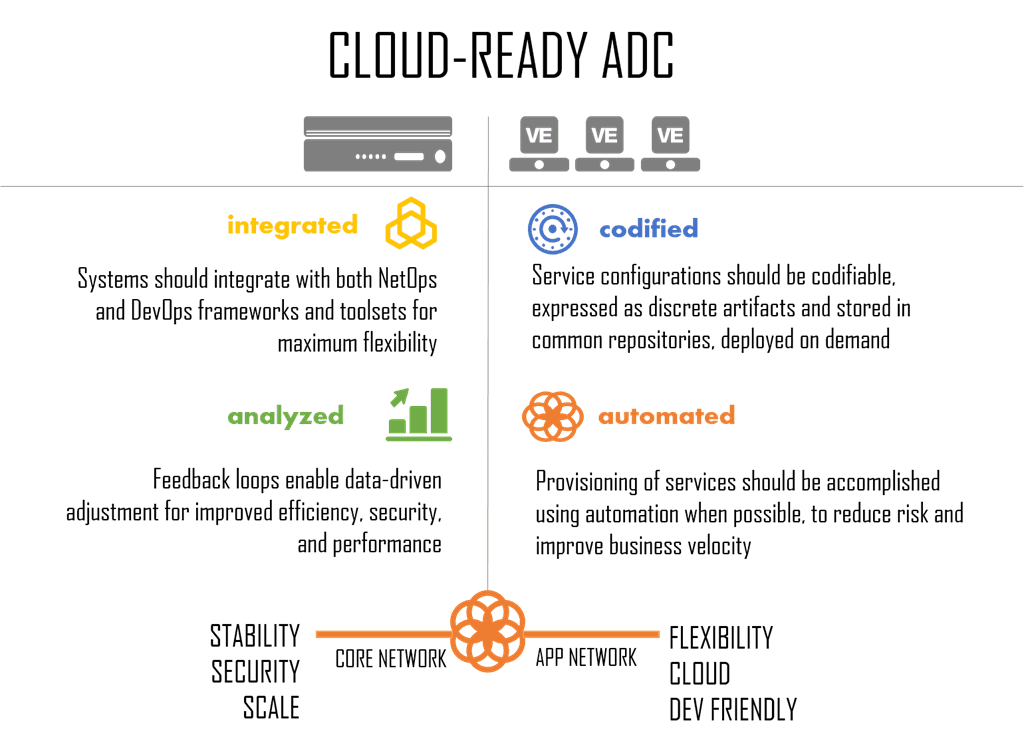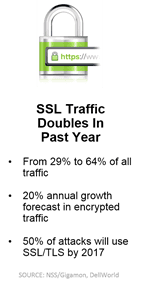
A cloud-ready application delivery controller (ADC) is not your traditional ADC. Available for deployment on custom or COTS hardware, it’s a scalable software-solution supporting both the need for fast, secure, and available delivery and deployment of applications. A cloud-ready ADC enables a modern, two-tiered approach to data center architectures combining traditional stability, security, and scale with modern flexible, cloud, and DevOps-friendly programmatic features.
What’s In It for DevOps?
Scaling modern and emergent applications is no longer about algorithms, but architectures. Architectures the the load balancing services of traditional ADCs are no longer able to support with the flexibility required for cloud, mobile, and emerging applications. Today’s load balancing services must be able to scale operationally as well as during delivery. That means native integration and support for the frameworks and tools used by developers and operations to programmatically provision, manage, and scale all the components that comprise a modern application. F5’s iSeries ADC is the most programmable ADC to date. With both REST and SOAP APIs, a robust scripting language that supports node.js and its 250,000 strong library of existing modules, iSeries is able to integrate with the tools used by DevOps every day to deliver and deploy applications into production. Puppet, Chef, and Ansible. Vagrant, OpenStack, and VMware. F5 has always supported the means to “roll your own” integration, but F5 iSeries brings more native integration to the table, ensuring that DevOps spends its valuable and limited time on what matters most: deploying applications and ensuring the right performance, availability, and security policies are in place.
This supports what Gartner has noted is necessary in the network for organizations to support what it has termed “Bimodal IT”:
- Build self-service capability into your network infrastructure which allows the lean/fast/agile teams to serve themselves (without waiting for the corporate IT and change windows). This includes base network concepts (VLANs), DNS/DHCP and L4-7 services (app delivery, security).
- Similarly, invest in networking solutions that are highly automated and include hooks that the DevOpsians want like Ansible, Chef, and Puppet.
And where private cloud stacks tend to offer only traditional load balancing capabilities, F5 iSeries provides rich, programmatic means of extending functionality without disrupting existing architectures. With its own iApp templates and support for native, cloud templates like OpenStack Heat, F5 iSeries

) ADC ensures that applications are able to take advantage of advanced services like web app security and request/response path routing without requiring the deployment of additional software that can disrupt architectures and serve to increase architectural debt.
Though it may sound contradictory at first, F5 iSeries on its latest hardware platforms is also a boon to DevOps and emerging applications. With its hardware-enabled scale and focus on security, iSeries in the core network enables applications to offload support for business required encryption (SSL/TLS) and operationally expensive key and certificate management to NetOps. Doing so leaves dev and devops to focus on apps and private cloud concerns and reduces the potential impact of DDoS attacks and encryption on application availability and performance. That’s going to turn out to be more significant than it seems at first blush. The use of and need for encryption is growing at a rapid rate, more than doubling in the past year. It’s estimated that by 2017 more than half of all attacks will be encrypted with SSL/TLS. That puts an incredible burden on app developers and devops to secure not only the apps but the platforms upon which those apps are deployed, not to mention the computational strain of decryption and inspection. Offloading to a dedicated service in the core network, like an F5 iSeries ADC, relieves the pressure on dev and ops and enables them to focus on their core.
F5 iSeries is not just a hardware or a product; it’s a platform for data center architectures that need both the stability, security, and scale of traditional hardware solutions along with the flexible, cloud-ready, programmable nature of software. With both, organizations can realize the services they need to support the private cloud and emerging application architectures delivering the applications critical to success in an application world.
About the Author

Related Blog Posts

Why sub-optimal application delivery architecture costs more than you think
Discover the hidden performance, security, and operational costs of sub‑optimal application delivery—and how modern architectures address them.

Keyfactor + F5: Integrating digital trust in the F5 platform
By integrating digital trust solutions into F5 ADSP, Keyfactor and F5 redefine how organizations protect and deliver digital services at enterprise scale.

Architecting for AI: Secure, scalable, multicloud
Operationalize AI-era multicloud with F5 and Equinix. Explore scalable solutions for secure data flows, uniform policies, and governance across dynamic cloud environments.

Nutanix and F5 expand successful partnership to Kubernetes
Nutanix and F5 have a shared vision of simplifying IT management. The two are joining forces for a Kubernetes service that is backed by F5 NGINX Plus.

AppViewX + F5: Automating and orchestrating app delivery
As an F5 ADSP Select partner, AppViewX works with F5 to deliver a centralized orchestration solution to manage app services across distributed environments.
F5 NGINX Gateway Fabric is a certified solution for Red Hat OpenShift
F5 collaborates with Red Hat to deliver a solution that combines the high-performance app delivery of F5 NGINX with Red Hat OpenShift’s enterprise Kubernetes capabilities.
